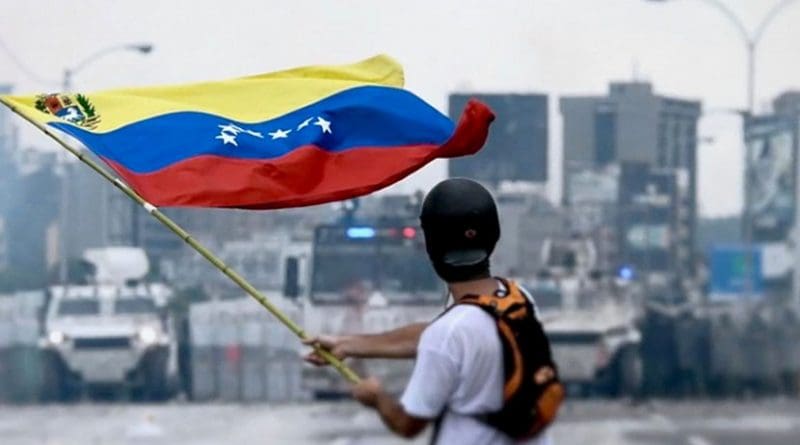Extremist Groups Well Placed To Exploit Venezuela’s Troubles – Analysis
As the Trump administration continues to support Venezuela’s opposition leader Juan Guaido over President Nicolas Maduro because of an apparently fraudulent presidential election, the impact of the crisis on the country itself is becoming apparent. Civil disorder, which has been building for months, is occurring in various parts of Venezuela and tens of thousands of refugees are entering neighboring countries.
US Treasury Secretary Steven Mnuchin and National Security Adviser John Bolton announced sweeping sanctions aimed at weakening Maduro’s grip on the oil-rich country by freezing state-owned oil company PDVSA’s assets and prohibiting US companies and citizens from conducting business with it. More than 100 individuals, entities and aircraft have been designated as blocked property.
But there is a bigger picture. As the bifurcating world looks upon Venezuela’s immediate future, there are other factors that contribute to the unstable political landscape of the northern cone of Latin America, which also includes Colombia, Suriname and Guyana. Trinidad and Tobago (T&T) is also clustered into this geographical area, as are the Netherlands Antilles.
Efforts to tackle terrorism, narcotics and the groups behind them, including Hezbollah, Al-Qaeda and Daesh, focus on individual issues of terrorism and crime in the northern cone. The Trump administration’s actions are certain to heat up this area in terms of the activity of these groups’ supporters.
Extremist groups’ capabilities in this area include the presence of Hezbollah on Isla de Margarita and Al-Qaeda and Daesh’s recruitment activity in T&T. The latter has been a hub for those two groups, specifically the activity of Jose Padilla in terms of delivering a potential dirty bomb to the US after 9/11, but also for sending recruits to the Levant to fight on behalf of Daesh. Al-Qaeda supporters were also thought to have used free-trade zones in Latin America in the mid-2000s to move money. The population that supports such groups in the northern cone is an underestimated concern in the current environment.
Following US President Donald Trump’s recognition of Guaido, Hezbollah declared its support for Maduro. Hezbollah has a long history with the now-sanctioned Maduro government. In 2008, the US Treasury imposed sanctions on two Venezuelan nationals, one of them a diplomat, for their Hezbollah connections. The terrorist group is also heavily involved in cocaine trafficking via the local community. It has supported Maduro in the past, especially in the wake of a failed assassination attempt by drone and other incidents that are falsely blamed on the US. Maduro’s former vice president Tareck Zaidan El-Aissami is purportedly a key interlocutor with Hezbollah, Iran and the local community.
Importantly, Hezbollah’s presence in Venezuela actually stretches along the coastline into Colombia. The city of Maicao on the Guajira Peninsula near the border to Venezuela is one particular point of interest, as the community there is connected to the creation of the free-trade zone on Isla de Margarita, which allowed Hezbollah to gain a major foothold and establish a base from which to operate from in terms of financing its activities. The impact of the ongoing Venezuelan crisis is a potential cause of concern for the country’s Hezbollah supporters.
Meanwhile, although there have been no recent attacks in T&T, more than 100 citizens have traveled to Syria and Iraq to fight with Daesh. In February 2018, the T&T authorities arrested some individuals who had planned to carry out attacks during the islands’ Carnival celebrations. Carnival time is now fast approaching for 2019 and there is a threat from individuals who may have been inspired by terrorist groups to carry out so-called “lone actor” attacks targeting public events or places. T&T is also the only Western Hemisphere country to experience a coup by a Muslim organization — in 1990, although it lasted just a few days.
The Trump administration’s Venezuela move is perhaps opening the door to a wider set of factors, including terrorist violence in the northern cone and throughout the Americas. The countries of the Lima Group all supported the US move, but the challenge now is for those countries in Central and Latin America to be on the lookout for increased activity by any of the extremist groups. The cone has a long history of being a support center for low-level but extremely toxic terrorist activity.
Overall, the current struggle over Venezuela’s future has other factors that will contribute to an unstable environment and may invite terrorists into the theater, if they are not already there. Hezbollah, Al-Qaeda and Daesh have all been seen in the northern cone and use the area for recruitment and transit. Given the background and current landscape, the potential for these groups to find more local support because of Venezuela’s precarious position may allow a more extensive entry of Daesh into Latin America. Daesh grew in the Levant because of collapsed states and riding traditional networks to grow their territory. Will Venezuela and the northern cone present the same opportunity?

